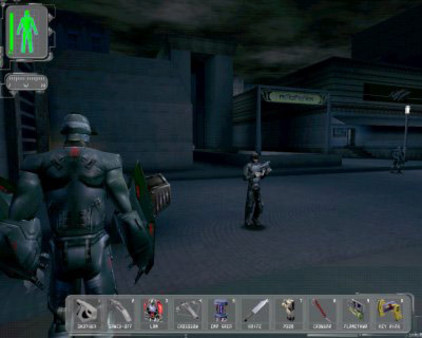Deus Ex: Game of the Year Edition on Steam - User reviews, Price & Information
The year is 2052 and the world is a dangerous and chaotic place. Terrorists operate openly - killing thousands; drugs, disease and pollution kill even more. The world's economies are close to collapse and the gap between the insanely wealthy and the desperately poor grows ever wider.
Deus Ex: Game of the Year Edition is a cyberpunk, rpg and stealth game
developed by Ion Storm
and published by Eidos Interactive Corp..
Released on March 29th 2007 is available in English only on Windows.
It has received 14,552 reviews of which 13,801 were positive and 751 were negative resulting in an impressive rating of 9.2 out of 10. 😍
The game is currently priced at 6.99€ on Steam, but you can find it for 2.65€ on Instant Gaming.
The Steam community has classified Deus Ex: Game of the Year Edition into these genres:
Media & Screenshots
Get an in-depth look at Deus Ex: Game of the Year Edition through various videos and screenshots.
System requirements
These are the minimum specifications needed to play the game. For the best experience, we recommend that you verify them.
User reviews & Ratings
Explore reviews from Steam users sharing their experiences and what they love about the game.
Similar games
View allFrequently Asked Questions
Data sources
The information presented on this page is sourced from reliable APIs to ensure accuracy and relevance. We utilize the Steam API to gather data on game details, including titles, descriptions, prices, and user reviews. This allows us to provide you with the most up-to-date information directly from the Steam platform.
Additionally, we incorporate data from the SteamSpy API, which offers insights into game sales and player statistics. This helps us present a comprehensive view of each game's popularity and performance within the gaming community.
Last Updates| Steam data | 14 February 2026 08:27 |
|---|---|
| SteamSpy data | 22 February 2026 21:55 |
| Steam price | 24 February 2026 20:44 |
| Steam reviews | 22 February 2026 18:00 |
If you'd like to dive deeper into the details about Deus Ex: Game of the Year Edition, we invite you to check out a few dedicated websites that offer extensive information and insights. These platforms provide valuable data, analysis, and user-generated reports to enhance your understanding of the game and its performance.
- SteamDB - A comprehensive database of everything on Steam about Deus Ex: Game of the Year Edition
- SteamCharts - Analysis of Deus Ex: Game of the Year Edition concurrent players on Steam
- ProtonDB - Crowdsourced reports on Linux and Steam Deck Deus Ex: Game of the Year Edition compatibility


 6.99€
Visit Store
6.99€
Visit Store
 🔥 Deal
-63%
6.99€
2.65€
Buy Now
🔥 Deal
-63%
6.99€
2.65€
Buy Now
 -46%
6.99€
3.83€
Visit Store
-46%
6.99€
3.83€
Visit Store
 -23%
6.99€
5.42€
Visit Store
-23%
6.99€
5.42€
Visit Store























